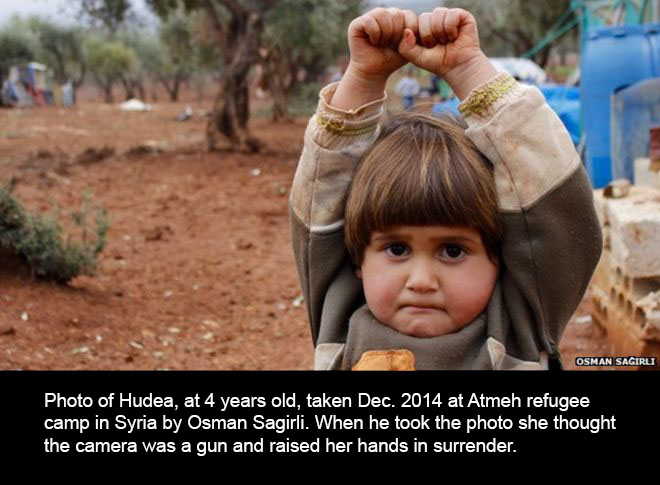What About the Refugees Anyway?
Part 1 - A Beginning and A Parable
by Mary Stephens
Nov. 2015
James 2:13 For
he shall have judgment without mercy,
that hath shewed no mercy;
and mercy rejoiceth against judgment.
There has been a lot of emotion, animosity and opinions about the refugee situation. Sadly, there has been a lot that, from my perspective, doesn't seem to reflect the mind of Christ - and I'm speaking about the Christian context here. (I don't expect that from the world.) Quite a lot of this is probably because modern right-wing and conservative politics have been made "the norm" and essential among Evangelicals and Fundamentalists. But, what do you do when some, or the majority of them, take a position on a significant issue that is contrary to scripture and the example of Jesus Christ?
Conservative politics and many conservative Christians say that Syrian refugees are very dangerous and must be refused. There are cries for our safety, accusations that most of them are "young men", and a fairly broad disregard of all the other refugees from other countries that need help. We've heard similar claims about the Mexican situation, except that the "loss of jobs" has been a major complaint on that.
First of all, I want to say that I am in no way trying to "solve the problem" here. I don't have a perfect answer for a situation as complicated as this. I actually doubt that anyone really does. Messy situations usually require multi-faceted answers.
| Xenophobia - intense or irrational dislike or fear of people from other countries. |
Another problem is the assumption by some conservative types that anything the current president wants to do is automatically intended for evil because he is allegedly "trying to destroy this country." Of course, it didn't help that he played "the God card" in his attempts to force the acceptance of the Syrian refugees. (I don't remember if he did regarding the Mexican situation or not.) This added confusion and angst for some people who didn't like to have their own beliefs used against them. Ahem.
The Bigger Picture Historically
Historically America has absorbed trouble-making refugees before, as well as those with bad customs. Also, a large majority of the humans who live in North America appear to have come here seeking refuge for one reason or another - war, economics, famine, persecution, disease, revolution, etc. Immigrants and "refugees", as the modern term is used, are not exactly the same thing, but in many ways the difference is minimal.
Here are just a few groups that have had "negative" aspects - and I've chosen all white races because some of the anxiety over "refugees" and "illegals" sometimes feels racist:
Irish - Came in the millions. They were despised and looked upon with great suspicion, and false accusations were laid against them. However, there is a reason why they are called "the fighting Irish," and their reputation for that was justly deserved in some instances. (I have Irish roots, among other things, so this is not intended to be slander against "those people". I am a descendent of some of "those people".) They also brought a very strong Roman Catholic tradition with them that was irrational and/or "dangerous" in some instances. [Note: They also suffered a great deal from prejudice.]
Italians and Sicilians - Brought the Mafia to this country. Al Capone's era is notable for the gangland violence and power. The power and heavy-handed control continued for years in certain sectors of industry and business, and may be with us still today if the truth were known.
English - Established slavery here which has been a bane to this nation ever since - first for the especially virulent and cruel strain that it was in the first place, and later because of the tragedies caused in trying to dismantle it through war and forced integration. Furthermore, the sad effects are with us still today in so many ways.
Many different European groups killed, mutilated and displaced the Indians, stole their lands, killed their food sources intentionally, and raped their women.
So, historically, we don't have much to stand on with claims that this group is "too dangerous". Immigrants and refugees have been "dangerous" all along. Some have been refused through the years for actual illnesses where the concern was over epidemics and such, but that isn't the issue here. Others have also been rejected simply for their race or ethnicity.
For my own part, I don't see that much difference between the wild antics of my Celtic, Germanic, and American Indian ancestors and the "Muslim insurgents." The big difference is that back when my ancestors were killing, raping and pillaging it was "politically correct" for everyone to act that way, and now it isn't.
But so much for history. It isn't our standard for behavior, and thank God for that. We need something better, namely the word of God and the mind of Christ! But, it isn't going to justify hate, I can tell you that.
What Would Jesus Do? Or What Would He Have Us to Do?
I'm not a fan of the whole WWJD movement. It was a commercialized Christian fad that didn't seem to have real and deep meaning to many of those who claimed it. Besides that, in many instances in our lives, we simply can't do what Jesus would do because we're not God. So it was bad theology, or doctrine, or both.
But, having said that, Jesus Christ did give us a specific answer to this particular issue. He also left us a very challenging example and some difficult commands.
Yes, I'm going to talk about the Good Samaritan. (You were expecting maybe the fall of Jericho? <smile>)
Luke 10:25-37
25 And, behold, a certain lawyer stood up, and tempted him, saying, Master, what shall I do to inherit eternal life?
From my understanding, the lawyers in the Jewish context of Jesus' day were experts in the O.T. Law, not the Roman law. They sort of, but didn't exactly correspond with our present day idea of a lawyer. But, you gotta love this guy for being so ridiculous. I mean, he stands up and tries to tempt the Son of God. Yeah, I know he probably didn't see it that way, but that's what was going on. Which should give us pause to consider. We know better, and yet are we guilty sometimes of the same thing?
26 He said unto him, What is written in the law? how readest thou?
Interestingly enough, Jesus points him right back to the law that he knew so well! He didn't just dive in a try to straighten him out here, He answered him where he was at in life and according to the knowledge that Jesus already knew he had. That's another point to ponder.
27And he answering said, Thou shalt love the Lord thy God with all thy heart, and with all thy soul, and with all thy strength, and with all thy mind; and thy neighbour as thyself. And he said unto him, Thou hast answered right: this do, and thou shalt live.
So, the lawyer answers, and he gets it right, and Jesus tells him to do that.
28 But he, willing to justify himself, said unto Jesus, And who is my neighbour?
It's important to realize that he asked who his neighbor was in order to justify himself. If we can define away all the people we don't want as our "neighbor," that makes obeying this a whole lot easier, which makes it easier to justify ourselves. If we can say that "those people" are too "dangerous" or "too far away" or "too hopeless" or "too dirty" or "stealing our jobs," then we can ignore them or reject them and still feel justified in ourselves. Do you see what I mean?
29 And Jesus answering said, A certain man went down from Jerusalem to Jericho, and fell among thieves, which stripped him of his raiment, and wounded him, and departed, leaving him half dead.
I'd just like to make one point here. The Good Samaritan did not help the violent and cruel thieves. But, he did help the person who was injured by those evil men.
30-32 And by chance there came down a certain priest that way: and when he saw him, he passed by on the other side. And likewise a Levite, when he was at the place, came and looked on him, and passed by on the other side.
Ah, here are the "good, godly men" of the day. Surely, they will do something "good and godly." The priest saw him and passed by on the other side of the road. The Levite seems to have actually stopped and pondered his condition, but then he went by on the other side of the road too. We are seeing some of these responses from the leaders of Christendom today. Some are not paying much attention to the need. Some are stopping and looking and giving a grand opinion, and then they are passing by on the other side as it were. They are not getting their hands dirty. As C. H. Sprugeon once said, "We hear a lot of noise in the kitchen, but we don't get any pudding." But, as the Greeks said to the Philip in John 12:20-21, "...Sir, we would see Jesus."
33-34 But a certain Samaritan, as he journeyed, came where he was: and when he saw him, he had compassion on him, And went to him, and bound up his wounds, pouring in oil and wine, and set him on his own beast, and brought him to an inn, and took care of him.
First of all, this is a man of a different culture and/or "race," and one that was generally despised by the Jews. They also were of a different religion that claimed that their temple in Mt. Gerizim was the right place to worship God. Today they might have been called a "cult." Yet, he is the one who shows compassion on the injured man. He binds his wounds, he supplies medical help, he provides transportation and gives him shelter and care.
35 And on the morrow when he departed, he took out two pence, and gave them to the host, and said unto him, Take care of him; and whatsoever thou spendest more, when I come again, I will repay thee.
Here we see that when he could not be there in person, he laid out his own money to make sure someone would take care of the injured man, and he committed to give more if it was needed. His compassion worked from a distance as well as in person; the injured man did not cease to be his neighbor because he was out of sight. I also find it kind of curious that there is no mention about him making sure that the host of the inn "had the same convictions" as he did. Just sayin'...
36 Which now of these three, thinkest thou, was neighbour unto him that fell among the thieves? And he said, He that shewed mercy on him. Then said Jesus unto him, Go, and do thou likewise.
This brings us back to a verse that I've been thinking about quite often lately.
James 2:13 For he shall have judgment without mercy, that hath shewed no mercy; and mercy rejoiceth against judgment.
James also told us this, Pure religion and undefiled before God and the Father is this, To visit the fatherless and widows in their affliction, and to keep himself unspotted from the world. James 1:27 And, there are quite a few widows and fatherless among the refugees from Syria.
Jesus said about Himself in Luke 4:18, The Spirit of the Lord is upon me, because he hath anointed me to preach the gospel to the poor; he hath sent me to heal the brokenhearted, to preach deliverance to the captives, and recovering of sight to the blind, to set at liberty them that are bruised,
As followers of the Lord Jesus Christ, we should be obeying His teaching and following His example. This means taking care of those who are broken, hurting or suffering in as much as we are able, and doing so even when we can't be there in person. This means visiting those in affliction when we can. This means having mercy on people. And, if we refuse to show mercy, it also means that we can look forward to judgment without mercy, which is really pretty scary.
There is a lot of talk about "purity" these days in the Lord's church; there isn't as much "pure religion...before God" as there ought to be. Maybe we need to focus on that kind of "purity" for a change. Not maybe - we should, because that is what mercy looks like with its shoes on.
There is also a lot of talk about the sin of Sodomy lately. But, all the emphasis seems to be on just one or two issues. Sodom was destroyed for a whole group of sins. Ezekiel 16:49-50 Behold, this was the iniquity of thy sister Sodom, pride, fulness of bread, and abundance of idleness was in her and in her daughters, neither did she strengthen the hand of the poor and needy. And they were haughty, and committed abomination before me: therefore I took them away as I saw good. This doesn't look too good for "the greatest nation on earth" (i.e. the U.S.A.), or a number of other Western nations. It also looks pretty bad for American Christendom. I would especially call your attention to the fact that not helping the poor and needy is mentioned among the sins here. Truly, friends, it frightens me to see and hear Christians voicing such hateful and heartless attitudes toward refugees and "illegal immigrants." Is this the mind of Christ? I mention that fairly often, but it is something that I too frequently find missing in people that call themselves Christians. I don't find it in myself as much as I'd like to.
Philippians 2:5 Let this mind be in you, which was also in Christ Jesus:
What about you? What are you saying on these subjects? Do your words and social media posts support your claim to be a follower of Jesus Christ? Do your actions reflect His actions and teachings? Are you doing anything positive to help?
Philippians 1:27 Only let your conversation be as it becometh the gospel of Christ...
2 Corinthians 8:9 For ye know the grace of our Lord Jesus Christ, that, though he was rich, yet for your sakes he became poor, that ye through his poverty might be rich.
![]()



